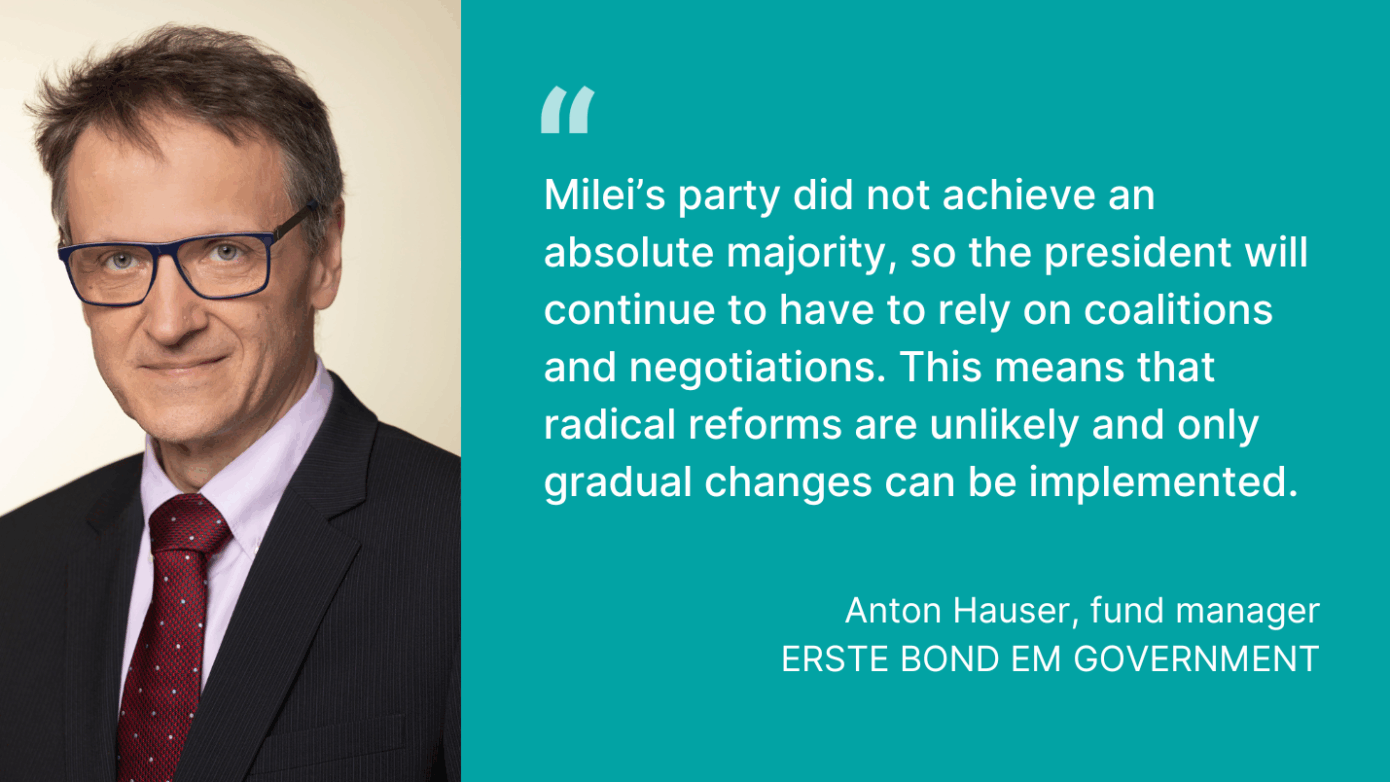President Javier Milei’s party won Argentina’s midterm congressional elections at the end of October by a surprisingly significant margin. With his liberal economic agenda and extensive spending cuts, he aims to stabilise Argentina’s ailing economy. But how realistic are far-reaching reforms given the lack of a majority in parliament? And what opportunities and risks do Argentinian government bonds offer investors? Fund manager Anton Hauser provides insights into the current situation and his assessment of the Argentinian economy.
What impact will Javier Milei’s election victory have on the balance of power in the Argentinian Parliament?
Anton Hauser: In the 2025 midterm elections, Javier Milei’s party, La Libertad Avanza (LLA), managed to significantly strengthen its position. Milei now has a blocking minority in Congress, which means he can block certain legislative changes and has a stronger negotiating position. However, the president’s party did not achieve an absolute majority, so President Milei will continue to have to rely on coalitions and negotiations. This means that radical reforms are unlikely and only gradual changes can be implemented.
What economic policy measures do you expect from Milei, and how do you assess the chances of an improvement in the Argentinian economy?
We are expecting a package of measures. Subsidy cuts, labour law reform and privatisation, cautious liberalisation of the foreign exchange market, and debt buybacks are all within the realm of possibility. Consistent implementation of the reforms should strengthen confidence in the Argentinian economy and thus come with positive consequences, especially in the medium to long run.
The USA has announced its intention to support Argentina under the new government of Javier Milei. To what extent does this bolster international investors’ confidence in the stability of Argentinian government bonds?
Even before the elections, Donald Trump’s US administration had promised Argentina a financial package worth USD 20bn, consisting of a currency swap between the central banks and direct interventions on the foreign exchange market. The aim was to alleviate liquidity bottlenecks and stabilise the peso. In addition, the US Treasury is considering the purchase of Argentinian government bonds through the Exchange Stabilisation Fund (ESF) in order to lower yields and facilitate refinancing.
This US aid is perceived as a geopolitical safety net and strengthens confidence in Argentina’s solvency in the short term. To support the reform programme and stabilise currency reserves, the IMF provided a USD 20bn aid package, making it a key player in Argentina’s economic policy. The combination of US aid and the IMF programme is regarded as a double safety net.

What are your expectations regarding the development of the Argentinian peso in the coming months?
Since December 2023, Argentina has been pursuing a crawling peg system, which means a controlled, gradual devaluation of the peso against the US dollar (currently 1% per month). In the wake of the election-related volatility, we expect this regime to be maintained in order to further lower inflation expectations and build confidence in the currency.
How do you rate Argentinian government bonds compared to other emerging markets? What political risks do you currently see for investors in Argentinian government bonds?
Argentinian government bonds denominated in US dollar currently pay yields in the region of 10%, which is significantly above the average of other emerging markets, which is about 7%. The bonds thus reflect the increased default risk and political uncertainty that continues to exist despite the recent stabilisation.
Political risks include strong social tensions, allegations of corruption surrounding Milei, and geopolitical dependence on the United States. All in all, Argentinian government bonds are more suitable for risk-tolerant investors who can also accept binary scenarios.
Notes: Please note that investing in securities entails risks in addition to the opportunities described above.
What scenarios do you envisage for a possible rescheduling or restructuring of Argentina’s debt?
Debt restructuring is not an urgent issue, but it does remain a latent risk. The restrictive fiscal policy combined with external aid and reforms is clearly aimed at avoiding having to go through a restructuring. That being said, structural weaknesses (high debt ratio of about 79% of GDP, negative reserves) and political uncertainty remain in place, and a negative shock could cause worries over a potential default to rise again.
Have there been any noticeable capital flows into or out of Argentine bonds since the election? How are you currently positioning the fund with respect to Argentinian government bonds?
Argentinian assets have reacted to the election results by posting strong gains. We expect further capital market-friendly reforms and are therefore overweight in Argentinian government bonds.
Risk notes ERSTE BOND EM GOVERNMENT
Please note that investing in securities also involves risks besides the opportunities described.
The fund employs an active investment policy. The assets are selected on a discretionary basis. The fund is oriented towards a benchmark (for licensing reasons, the specific naming of the index used is made in the prospectus (12.) or KID “Ziele”). The composition and performance of the fund can deviate substantially or entirely in a positive or negative direction from that of the benchmark over the short term or long term. The discretionary power of the Management Company is not limited.
Legal disclaimer
This document is an advertisement. Unless indicated otherwise, source: Erste Asset Management GmbH. The language of communication of the sales offices is German and the languages of communication of the Management Company also include English.
The prospectus for UCITS funds (including any amendments) is prepared and published in accordance with the provisions of the InvFG 2011 as amended. Information for Investors pursuant to § 21 AIFMG is prepared for the alternative investment funds (AIF) administered by Erste Asset Management GmbH pursuant to the provisions of the AIFMG in conjunction with the InvFG 2011.
The currently valid versions of the prospectus, the Information for Investors pursuant to § 21 AIFMG, and the key information document can be found on the website www.erste-am.com under “Mandatory publications” and can be obtained free of charge by interested investors at the offices of the Management Company and at the offices of the depositary bank. The exact date of the most recent publication of the prospectus, the languages in which the fund prospectus or the Information for Investors pursuant to Art 21 AIFMG and the key information document are available, and any other locations where the documents can be obtained are indicated on the website www.erste-am.com. A summary of the investor rights is available in German and English on the website www.erste-am.com/investor-rights and can also be obtained from the Management Company.
The Management Company can decide to suspend the provisions it has taken for the sale of unit certificates in other countries in accordance with the regulatory requirements.
Note: You are about to purchase a product that may be difficult to understand. We recommend that you read the indicated fund documents before making an investment decision. In addition to the locations listed above, you can obtain these documents free of charge at the offices of the referring Sparkassen bank and the offices of Erste Bank der oesterreichischen Sparkassen AG. You can also access these documents electronically at www.erste-am.com.
Our analyses and conclusions are general in nature and do not take into account the individual characteristics of our investors in terms of earnings, taxation, experience and knowledge, investment objective, financial position, capacity for loss, and risk tolerance. Past performance is not a reliable indicator of the future performance of a fund.
Please note: Investments in securities entail risks in addition to the opportunities presented here. The value of units and their earnings can rise and fall. Changes in exchange rates can also have a positive or negative effect on the value of an investment. For this reason, you may receive less than your originally invested amount when you redeem your units. Persons who are interested in purchasing units in investment funds are advised to read the current fund prospectus(es) and the Information for Investors pursuant to § 21 AIFMG, especially the risk notices they contain, before making an investment decision. If the fund currency is different than the investor’s home currency, changes in the relevant exchange rate can positively or negatively influence the value of the investment and the amount of the costs associated with the fund in the home currency.
We are not permitted to directly or indirectly offer, sell, transfer, or deliver this financial product to natural or legal persons whose place of residence or domicile is located in a country where this is legally prohibited. In this case, we may not provide any product information, either.
Please consult the corresponding information in the fund prospectus and the Information for Investors pursuant to § 21 AIFMG for restrictions on the sale of the fund to American or Russian citizens.
It is expressly noted that this communication does not provide any investment recommendations, but only expresses our current market assessment. Thus, this communication is not a substitute for investment advice.
This document does not represent a sales activity of the Management Company and therefore may not be construed as an offer for the purchase or sale of financial or investment instruments.
Erste Asset Management GmbH is affiliated with the Erste Bank and austrian Sparkassen banks.
Please also read the “Information about us and our securities services” published by your bank.

